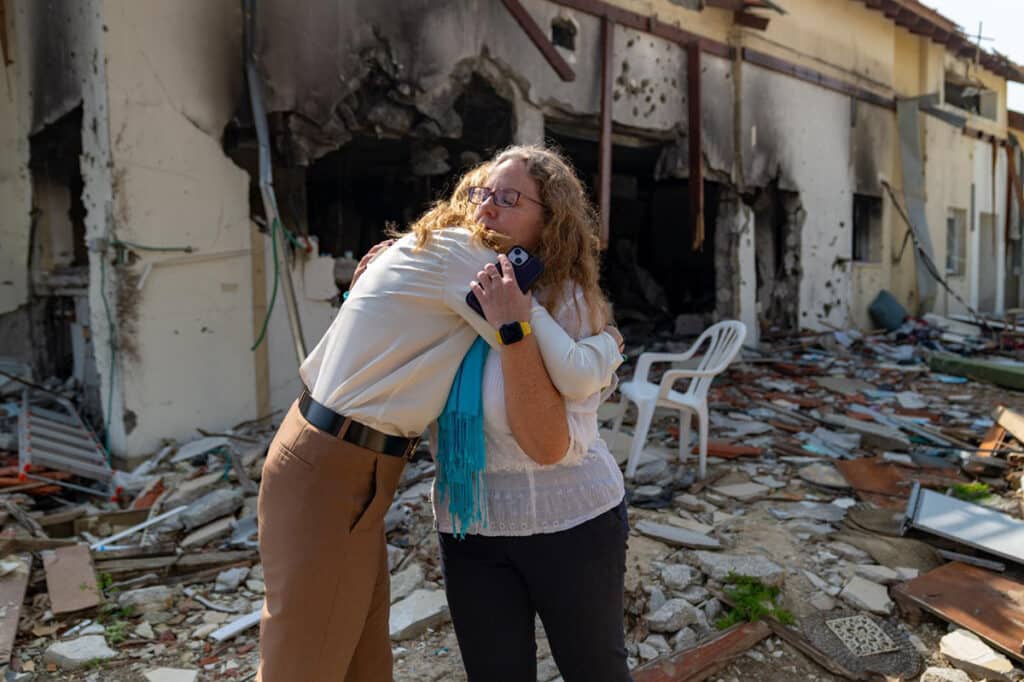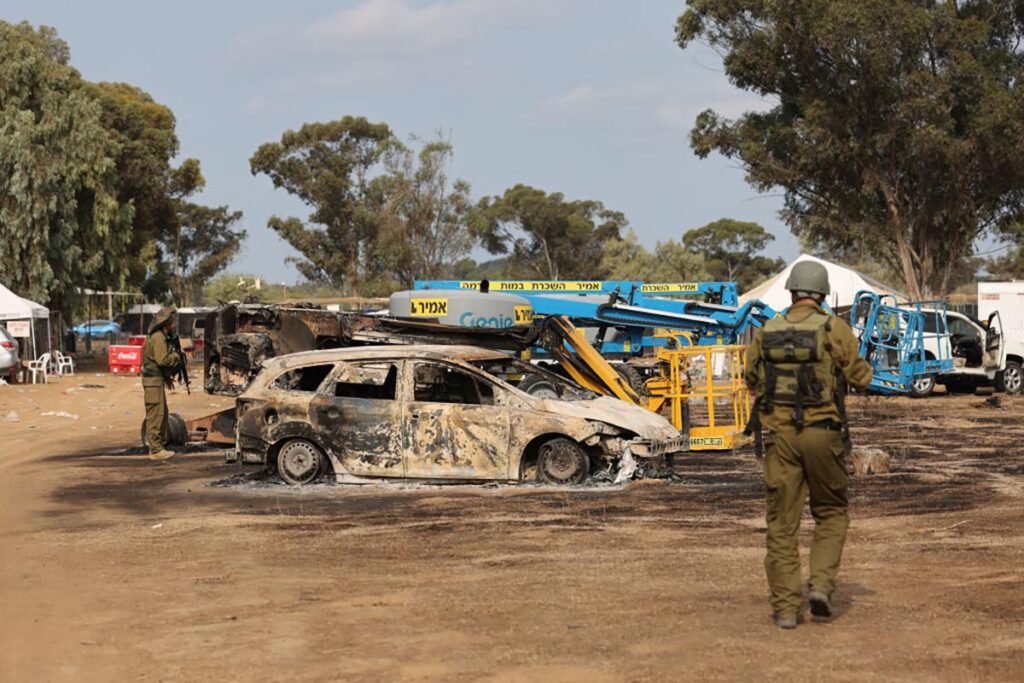Almost every town near the Gaza border announced last week that they refused to take part in a state memorial ceremony planned to mark the one-year anniversary of the Oct. 7th attacks.
Only two cities, Ofakim and Sderot, expressed a willingness to take part in the ceremony.
Why are so many towns opposed to a national memorial? Is there a compromise that would fix the situation?
What happened?
The Israeli government announced on Aug. 18th that Transportation Minister Miri Regev would be organizing a state ceremony to commemorate the Oct. 7th attacks.
The memorial will be held on Oct. 7 instead of the Hebrew date, the 22nd of Tishrei. The ceremony will be pre-recorded without an audience to avoid protests.

However, traditionally, state commemorations take place on Hebrew dates, but the government explained that since the date Oct. 7 has special significance, the ceremony this year will be held then.
Future commemorations will be held a few days after the Hebrew date since the attacks occurred on the Jewish holiday of Simchat Torah when Jews are not supposed to work, meaning a ceremony could not be held without violating religious laws. Holidays also have to be kept joyous under Jewish law and can’t be made into days of mourning, with even grieving relatives having to pause their mourning on holidays.
Shortly after the government’s announcement, many of the kibbutzim and border towns that were targeted in the attack announced that they would not be taking part in the ceremony.
Instead, the towns announced that they will hold their own smaller ceremonies in their communities to commemorate the attack.
The controversy surrounding the event
Many towns in southern Israel expressed concerns that a state ceremony would be made political and argued that the government should be focused on freeing the hostages, not producing large events.
Affected communities also insist that since Oct. 7 happened under the Netanyahu government’s watch, they should not be the ones to organize a memorial.
Many residents of the south, especially those with family members still held hostage in Gaza, hold the government responsible for the failures that surrounded Oct. 7 and its aftermath, and have called for the government to resign.
The most comparable situation in Israel’s history is the Yom Kippur War in 1973, when many Israelis blamed the government for the initial attacks and heavy losses. However, by the first anniversary of the war in 1974, members of the government had already resigned.
Residents of Kfar Azza, one of the kibbutzim hit hardest by the Oct. 7 attack, stated: “It would be appropriate for the government, together with the entire people of Israel, to concentrate its full efforts, night and day, on rescuing the hostages and to be content with lowering the flag to half-mast, standing for a moment of silence with a siren, and not producing grandiose events.”
Kibbutz Nir Oz called for the government to transfer its budget for the ceremony to a civilian body that would include representatives from across Israel, without any politicians.
The choice to have Regev organize the event also sparked criticism as the transportation minister has a history of conflict with communities in southern Israel.
Throughout the protests surrounding the government’s planned judicial reform last year, many right-wing activists – including central figures in Regev’s Likud party – portrayed the kibbutzim as being anti-government, even going as far as calling them traitors. Many of those kibbutzim are on the Gaza border and were communities directly targeted on Oct. 7.

Just a few weeks after the Oct. 7th attacks, Regev showed up at Kibbutz Be’eri – where over 130 were killed – without coordinating her visit beforehand. Kibbutz residents blocked her entry, arguing that she was only there for a photo-op and that her party had called them “traitors and supporters of terrorism.”
Regev argued with the residents, reportedly even shouting at them “If you don’t let me in now, we’ll provide care for you last.”
Israeli government insists only it can organize the Oct. 7 memorial
Regev has dismissed the criticism surrounding the event, saying that she would “ignore the noise” and continue organizing the ceremony.
The minister insisted that the attacks needed to be commemorated with a state memorial and that she would handle the ceremony with “sensitivity, dignity, and respect.”
Regev compared the communities wanting to hold their own alternate ceremonies to a controversial yearly ceremony between Israelis and Palestinians on Israel’s Remembrance Day for fallen soldiers and victims of terrorism. The comparison sparked outrage and Regev later denied she had made such a comparison.
Sderot mayor Alon Davidi expressed support for a state ceremony, stressing that one is needed because not all the victims were from southern communities. “Where will they have to go on October 7 and, for one moment, remember their loved ones in a stately way?”
“If there was no ceremony, what would they say? They would say, ‘The State of Israel doesn’t want to hold a memorial?’ Of course it should be memorialized,” added Davidi.
President Herzog offers compromise, victims prepare alternate ceremony
In an effort to bridge the gap between the government and the communities boycotting the ceremony, President Isaac Herzog recommended that the state ceremony be organized by his office instead, as the president’s office is usually seen as less political.
While residents of the south expressed support for the initiative, Regev rejected the option outright, accusing Herzog of “taking a side.”
Israeli singer and “Fauda” star Idan Amedi, who was wounded while fighting in Gaza as a reserve soldier, called on Regev to join the president’s initiative on Sunday.
“Compromise in this matter will not reduce you and it is not folding. On the contrary, we need more compromises between us in this bloody time. To give us all the opportunity, despite the differences, to cry together, to console together for our loved ones who are lost,” said Amedi.
Amid the controversy, an alternative Oct. 7 ceremony in Tel Aviv is being organized by victims of the attack.

Many popular Israeli musicians, including Amedi and Aviv Gefen, have expressed support for the alternate ceremony. Several other artists have refused to take part in the state ceremony.
Yonatan Shamriz, whose brother was mistakenly killed by IDF troops along with two other hostages in December, is one of the organizers of the community-organized ceremony.
“I told myself that I will not let any politician determine how my friends, my community from the kibbutz, and the fallen soldiers will be remembered. This day should be for unity,” said Shamriz.
Shamriz explained that the ceremony will be focused on having families of victims talk about their loved ones, along with songs by Israeli artists. He added that “a pre-recorded ceremony by a government that has not met with the affected communities is alienating. There is no emotion in it, it is very artificial, and we are trying the opposite.”